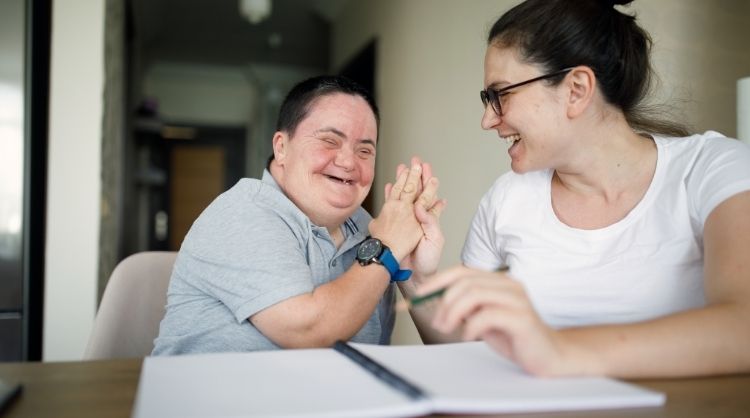What’s the difference between aged care and disability courses?

Looking to make a difference in the lives of others? The sectors of aged care and disability support are often challenging, yet highly rewarding fields – and are now among the most in-demand professions in the community services industry.
Those with a keen interest in helping people will thus find plenty of well-paying opportunities in either field; though while both have plenty of overlap, it’s worth noting the key differences that set them apart.
We discuss these below – along with what to expect in a disability or aged care course.
The difference between aged care and disability
While both aged and disability care focus on supporting the individual social, healthcare, and personal needs of clients, the two areas have their crucial differences.
Those working in aged care will likely find themselves stationed in one location – typically in an aged residential facility or nursing home. Much of your work will thus take place indoors, with your daily tasks often performed as part of a team. Daily tasks may include assisting with residents’ personal care (i.e. showering, medication, meal preparation), while helping them retain their autonomy in everyday activities, where possible.
A common goal among aged care workers is also ensuring their client has the social and familial support they need. This could involve encouraging family members to visit, helping them maintain friendships, and providing them opportunities to forge new ones in the facility.
Disability care workers, on the other hand, may find themselves travelling to the clients’ individual homes to provide assistance. Locations may therefore differ each week, as you’ll likely be tending to different clients at a time. You’ll also be working closely with the NDIS, with the ultimate goal of providing those living with disability the tools, services, and support they need to be active, independent members of society.
While aged care is more focused on retaining the autonomy and social life of the elderly, disability care is dedicated to helping those with a disability better (and more easily) integrate into their community. This could include provision of resources that help them perform everyday tasks, acquire job opportunities, and facilitate social outings with minimal assistance.
What skills can you learn from aged care and disability courses?

Aged care and disability courses can share plenty of similar skills areas – including units that focus on safe client care practices, the ability to offer individualised support, encouraging independence and healthy wellbeing, and effective communication in a health or community services environment.
However, depending on your education provider, either course may focus on significantly different areas.
Upskilled’s CHC33021 – Certificate III in Individual Support (Ageing) course, for example, hones in on the skills required to empower older people, support those living with dementia, and maintain positive relationships with families and other carers.
Upskilled’s CHC33021 – Certificate III in Individual Support (Disability) course, on the other hand, focuses more on empowering people with disability through provision of proper services, tools, and resources; along with supporting community involvement and social inclusion, and helping facilitate ongoing skills development.
What are the benefits of enrolling in aged care and disability courses?
- Build valuable transferable skills.
- Explore fulfilling career paths.
- Enter growing, in-demand industries.
- Plenty of courses can be completed online.
1. Build valuable transferable skills.
An aged care or disability course not only equips one with the crucial skills and knowledge for proper client care – it also helps you build valuable transferable skills. These include your ability to effectively communicate with others; work independently; forge lasting, healthy relationships, and work with a diverse range of people. Such a skill set can help you advance in the industry, aiding you up the ladder towards more managerial roles.
Additionally, these skills are easily transferable to other community service careers (and plenty others beyond), expanding your horizons of professional opportunity.
2. Explore fulfilling career paths.

Those who work in disability support or aged care often cite personal or career fulfillment as a leading benefit of the job. The opportunity to empower those who need it is an often rewarding experience – one that both professions constantly provide.
As a disability support or aged care professional, your day-to-day tasks will typically consist of helping others, forming meaningful connections, and ensuring their lives are made a little better each day. You’ll also meet clients of different backgrounds and personalities, helping you get to know people from different walks of life.
The profession is thus a highly dynamic one, where no two days are ever the same – making for a constantly interesting and challenging career path.
3. Enter growing, in-demand industries.
Not only do both disability and aged care offer plenty of career satisfaction, they’re also both rapidly growing, in-demand industries.
According to Labour Market Insights, aged and disabled carers are due to experience great leaps in employment in the years to 2026. The industry has been experiencing “very strong” growth over the past five years, with 266,900 workers recorded in 201. This number is expected to increase to 341,800 by 2026.
With high demand that’s only expected to grow, those in either industry can enjoy a great level of job security.
Though the average full-time worker is typically paid around $1,265 AUD per week, there’s plenty of opportunity to earn more as experience grows.
4. Plenty of courses can be completed online.
Finally, plenty of aged and disability care courses can now be completed online. Both of Upskilled’s certificate programs, for example, use this delivery model, allowing students the flexibility of studying at a time, place, and pace of their choosing.
On top of that, the actual industries themselves are also known for their flexible work opportunities. Aged care workers can typically choose to work part-time if need be, and have the option of working in a variety of different facilities. Similarly, disability support workers can also choose to work part-time hours depending on their schedule. Such arrangements, however, can differ from one organisation to the next.
How long does it take to complete disability and aged care courses?
The timeframe of a disability or aged care course will depend on the program and your education provider.
Upskilled’s CHC33021 – Certificate III in Individual Support (Ageing) and CHC33021 – Certificate III in Individual Support (Disability) courses, in particular, both take an average of 12-18 months to complete. Being self-paced programs, the timeframe is dependent on the number of hours you dedicate to the course each week.
Those who study at least 18 hours per week may complete the course in 12 months, while those who put in 15 hours per week may complete the course in 18.
Providing thorough explorations of both the knowledge and practical skills required to support the aged or those with a disability, Upskilled’s community services courses are effective stepping stones towards entry-level employment in either industry.


)
)

